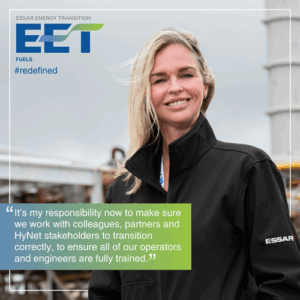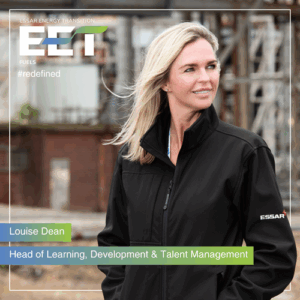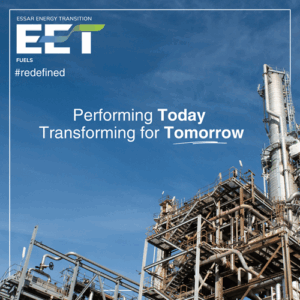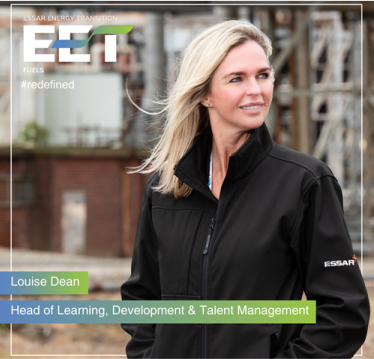At EET Fuels, we’re leading the energy transition by performing today, transforming for tomorrow, and delivering the UK’s first low carbon refinery.
Our people are vital to achieving our ambition, and #redefined showcases the work that they are doing to deliver the fuels our community needs, now and in the future.
This month, we spoke to Louise Dean, head of learning, development and talent management. Louise joined EET Fuels with an educational background four years ago and now has a very important role in preparing our highly trained employees for the energy transition.

How would you describe your day-to-day role?
My role is to make sure we offer the right training development at EET Fuels. It’s quite in-depth training because we’re a health and safety COMAH Tier 1 site. There are only so many in the UK and it’s all based around the risk element and the health and safety on the site. My team also makes sure that all 800 employees are sufficiently trained to carry out their role in a safe manner, ensuring we adhere to all government legislation.
Because of our COMAH rating, we have our own medical team, paramedics, fire and occupational health on site. That just gives you an insight as to how hazardous the site is and how important it is that everyone is trained to the highest standard.
We look after personal development, so that might be helping people to attend a course or a webinar to advance their core skills or to pursue a qualification, which could be a Masters Degree or level 3 qualification.
We also make sure succession planning is up to date for all employees, making sure everyone is completely competent in their role. So, they have interviews, and we monitor their charterships. For example, engineers need to have the correct chartership with the Engineering Awarding Body and we do different gradings for their progression, for which they may have to attend a course or obtain a qualification. Individual line managers manage the actual process, but my department oversees everything.
Talent management is a key area for my team too. I’m responsible for all the talent coming into the business, so that could be apprentices, graduates or interns and I need to make sure we bring the right talent in at the right time.
How has your role been redefined to support EET Fuels in reaching its target to reduce its carbon emissions by 95% by 2030?
It’s my responsibility now to make sure we work with colleagues, partners and HyNet stakeholders to transition correctly, firstly with the right training and development, so as we transition, we need to ensure all of our operators and engineers are fully trained. A good example is the first furnace that has arrived on plant to start the decarbonisation process, we need to make sure people are trained in timely manner. Secondly, I need to be involved with all our awarding bodies to align our apprenticeships because the engineering apprenticeship standards will change as we decarbonise, as will the machinery, so we need to make sure they’re completely up to speed.

What does success look like in your role for 2024?
We were knocked back by Covid because when we had to work remotely, training got pushed to the side, except for those who could be on site in line with Covid regulations and that has given my team a two-year backlog. We’ve only just got through this, and we now need to make sure they have the right development, so including more of the ‘nice to haves’, where people can access additional training to help them in their roles.
Another piece that we’re working on is online learning, we have a great new platform so we can do some of the nicer things around equality, diversity and mental health for example.
We’re also doing a lot around personal development and leadership, which is one of our key drivers for 2024.
As a team, how would you say you are contributing to the UK’s energy transition?
Massively, especially through our work with local schools and the community. I have a team member who leads on this and goes to development days, Apprenticeship Week incentives, STEM events with schools and community colleges etc.
I’m also part of the HyNet sub-committee with Chester University, building skills and training now for the transition.
I’m also supporting the EET Hydrogen team and working with Marcos Matijasevich who is head of decarbonisation projects for EET Fuels, and I support them with additional HR data requirements and any papers that need to go to government.
In your role, what do you think will be the key areas of focus or challenges in the next three years, and how do you plan to address them?
Keeping with the times, so moving forward, making sure we have the right training and development in place as we transition. Also, keeping aligned with Department of Education (DfE) to ensure that the apprenticeships standards are upheld and we’re aware of any necessary changes as we deliver our apprenticeship scheme on site and into the future.

